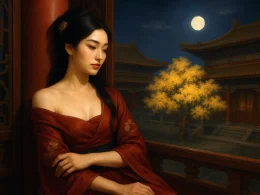A wind, bringing willow-cotton, sweetens the shop,
And a girl from Wu, pouring wine, urges me to share it
With my comrades of the city who are here to see me off;
And as each of them drains his cup, I say to him in parting,
Oh, go and ask this river running to the east
If it can travel farther than a friend's love!
Original Poem
「金陵酒肆留别」
李白
风吹柳花满店香,吴姬压酒劝客尝。
金陵子弟来相送,欲行不行各尽觞。
请君试问东流水,别意与之谁短长?
Interpretation
Composed during Li Bai's youthful travels when passing through Jinling (modern Nanjing) to bid farewell to friends, this work stands out for its absence of conventional parting sorrow. Instead, it blends youthful boldness, sincere friendship, and the light melancholy of separation with a vivid, lively tone, showcasing the elegant, unrestrained spirit characteristic of Li Bai's early poetry.
First Couplet: "风吹柳花满店香,吴姬压酒劝客尝。"
Fēng chuī liǔ huā mǎn diàn xiāng, Wú jī yā jiǔ quàn kè cháng.
Willow down wafts on breeze, filling the inn with scent; A Wu maiden presses fresh wine, urging us to relent.
The opening couplet paints a dynamic, lifelike scene. "Willow down" indicates late spring, suggesting charming scenery while its drifting nature subtly implies parting. "Filling the inn with scent" wonderfully combines the fragrance of willow flowers, wine, and the spring atmosphere in Jiangnan. "Pressing wine" (filtering new wine from sediment) adds authenticity, presenting both southern scenery and human warmth.
Second Couplet: "金陵子弟来相送,欲行不行各尽觞。"
Jīnlíng zǐdì lái xiāng sòng, yù xíng bù xíng gè jìn shāng.
Jinling's young friends gather to see me off; Those leaving, those staying, drain their cups with a scoff.
This couplet captures the parting moment's most touching aspect. "Wanting to leave but unable to" precisely depicts the hesitant, lingering state between traveler and well-wishers. All unspoken feelings transform into the bold, silent act of "draining their cups"—no tears, only hearty drinking, making youthful friendship appear particularly fervent and pure.
Third Couplet: "请君试问东流水,别意与之谁短长?"
Qǐng jūn shì wèn dōng liú shuǐ, bié yì yǔ zhī shuí duǎn cháng?
Ask the endless river flowing to the east: Whether parting grief or its course has greater length, at least?
The poet uses the immediate scene to express inner feelings, comparing abstract parting sorrow with the eternal "east-flowing river." This seemingly naive yet bold question avoids direct emotional declaration, instead using "which is longer" to demonstrate deep affection and literary power. The river comparison lends cosmic scale to their parting feeling, suggesting it outweighs even nature's grandeur.
Holistic Appreciation
This poem resembles a vivid "Farewell Banquet in Jiangnan Spring" painting. Its six lines unfold clearly: the first couplet sets the scene and atmosphere; the second portrays characters and emotions; the final couplet uses the landscape to elevate feelings to a climax. The poet expresses parting sorrow through joyful scenery—melancholy yet not sorrowful, blending boldness into reluctance, and revealing freedom within deep affection. Its sincere emotion and fresh, lively language fully demonstrate the elegant, unrestrained, and spirited style of Li Bai's early poetry.
Artistic Merits
- Strong Sense of Immediacy: From "willow down in breeze" to "maid pressing wine" and "friends draining cups," the vivid scenes and lively characters make readers feel present.
- Subtle Yet Full Emotional Expression: Without direct mention of "sadness" or "reluctance," deep parting feelings permeate through environment, actions, and clever metaphors.
- Skillful Conclusion, Transforming Abstract into Concrete: The rhetorical question comparing intangible "parting feeling" with tangible "east-flowing river" gives abstract emotion magnificent imagery and endless vitality, making it an immortal line.
Insights
This poem shows that parting need not always be tearful sorrow. It can be a bold pause in friendship marked in wonderful times, with kindred spirits, in the most hearty manner. Li Bai teaches us that sincere friendship can transform sorrow into an aesthetic, powerful experience. Comparing parting grief to the river's length reflects deepest confidence in friendship's eternity. This open-mindedness and uplifted spirit facing separation is precisely the glorious refraction of High Tang spirit in a young soul.
Poem translator
Kiang Kanghu
About the poet

Li Bai (李白), 701 - 762 A.D., whose ancestral home was in Gansu, was preceded by Li Guang, a general of the Han Dynasty. Tang poetry is one of the brightest constellations in the history of Chinese literature, and one of the brightest stars is Li Bai.












